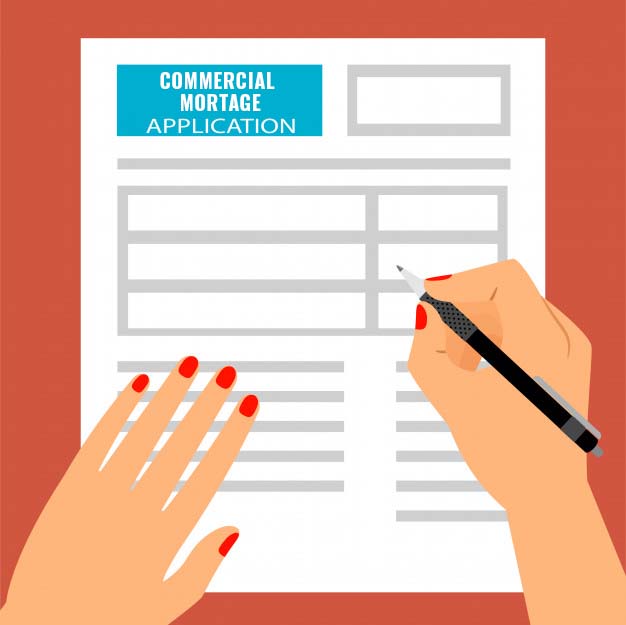Commercial Mortgage
Are you hoping to extend your business? Have you realized that the expense of renting has gotten too expensive? If the answer to these questions is “yes”, you might find that a commercial mortgage can offer business finance alternatives you didn’t know about initially.
What is a Commercial Mortgage

Commercial mortgages are not the same as residential mortgages in various ways, including the following:
- The loan-to-value ratio might be lower for a commercial mortgage, which means less of the total value of the property is secured by the loan.
- The interest rate on a commercial mortgage is higher than on a residential mortgage.
- Commercial mortgages are normally amortized over a period of 20 years or more, and repaid in regular installments.
How does a Commercial Mortgage Work
Commercial mortgages can also be utilized to expand an existing business. It can also be used for residential or commercial property development. Through the securing of a business to a property (for example bars, restaurants, guesthouses), commercial mortgages will, in general, be the primary resource for financing any business development plan.
The commercial mortgage market represents a smaller market share than residential mortgages. However, their overall value is disproportionately high. In contrast to a residential mortgage, a commercial mortgage broadens finance in four particular ways:
- Buying business premises
- Securing land development ventures
- Developing an owner-occupied business
- Adding to a buy-to-let portfolio
Commercial mortgages are organized to suit both the lender and the borrower. The lender needs to see security on their loan and the borrower wants to profit through reduced repayments (compared to renting).
A commercial property mortgage is usually a long-term loan (often as long as 25 years) that gives a capital to purchase business premises. The mortgage lender will typically lend up to 70% of the property’s value, leaving the business to pay its regular mortgage payments and using any working capital to finance the development.
Because most commercial mortgages just offer up to 70% of the total value of the property, the lender depends on the business to find the rest so as to complete the purchase. This is often a substantial amount of cash to come up with.
How Refinancing Commercial Mortgages Work
In the event that your company already possesses its own premises, remortgaging it can allow the opportunity of releasing its equity.
Refinancing commercial mortgages tend to be utilized as a very practical financing option, especially when property costs are set to increase. It can then lessen the expenses of your borrowing or securing better rates on your borrowing.
Simply put, refinancing a commercial mortgage means paying off one mortgage and replacing it with another. It is usually done to obtain better interest rates, opening up more sources of cash for the business.
You can refinance your mortgage if the business owns (or partly owns) a property. Commercial mortgages are calculated and set up in totally different ways compared to residential mortgages. Because of this, when a business chooses to refinance the terms of their mortgage, their negotiations can be supported with newer finance and valuation figures.
New accounts, projections or a more detailed set of balance sheets can impact the lender to give decreased rates or to loan more capital for the company. On the off chance that you can demonstrate an improved credit history, it is likely the bank will have more trust in your ability to make your repayments, which further increases the probability of better rates.
Why Apply for a Commercial Mortgage
A commercial mortgage can do significantly more than simply house your business, they are also increasingly seen as a source of business financing.
Claiming your own business premises means you lessen the danger of being exposed to increasing rental charges. Commercial mortgages can help future-proof your business by allowing it to access equity as the property price increases after some time.
There are various advantages to choosing a commercial mortgage, many of which look to offer future sources of funding and finance:
- Release capital for investment or growth
- Consolidate business debts
- Buy new equipment
- Expand trading
- Cheaper than renting
- Option for sub-letting or leasing parts of the property to create an ancillary income
Business owners can utilize a commercial mortgage to purchase a business property either for their own business use, to lease, for purchasing a company, or unlocking equity inside buildings that are already owned. It has become an increasingly flexible way of financing your property purchase – inasmuch as you have tangible assets to secure against.
Who Lends Commercial Mortgage Loans
- Traditional Banks
- Asset-backed Trusts (CMBS) – hard money lender
- Government-sponsored Enterprises
- GSE-backed mortgage pools
- Life Insurance Companies
How to Apply for Commercial Mortgage

Rates can vary, as can commercial speciality. A few lenders offer mortgages just when there is a lot of asset security available, while others like to loan to owner-businesses, or will only finance land developments.
Any potential borrower will be subject to certain financial checks. These usually stretch out to:
- Three years of accounts (or tax returns)
- Current and projected performance figures
- Bank statements
- Details and profiles of all directors and partners of the business
- Asset and liability statements
Common Interest and Repayment Terms for Commercial Mortgage Loans
Traditional Commercial Loan Mortgage loans are up to 85% of loan-to-value (LTV). They’re the best option for established businesses who have been operating for at least 2 years and have good credit.
The loan term is somewhere in the range of 7 to 30 years. Conventional commercial mortgage loans given by traditional banks offer fixed and variable rates which are typically somewhere in the range of 5% and 7%. To qualify for terms of 5 to 10 years, you would require a FICO rating of 660 or higher and an up front installment of no under 20%.